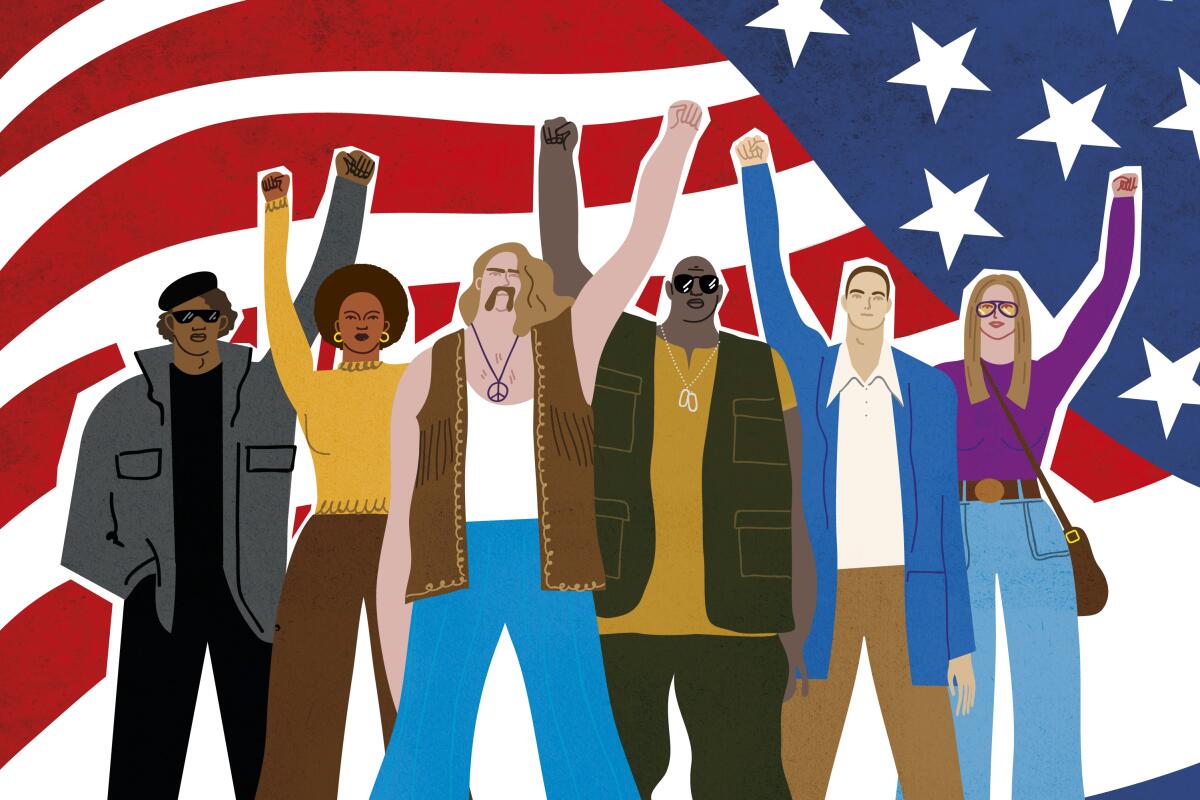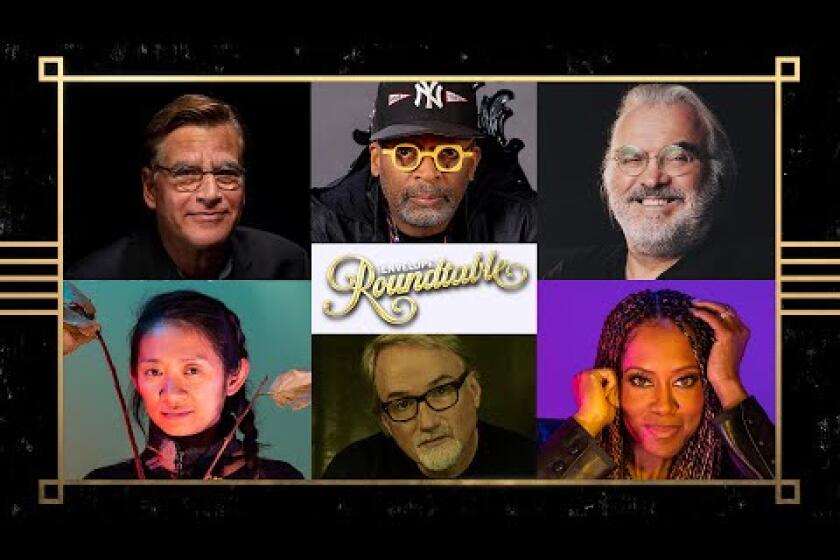The good old days in these 1960s-set films means the spirit of outrage and protest

The famed quote “Those who do not remember the past are condemned to repeat it” could handily apply to a sizable group of awards-season films that take place either in part or entirely in the turbulent 1960s.
The Envelope spoke about that watershed decade with an array of creative forces behind six of these movies. And, although these phone chats took place individually, they added up to what might be described in these pandemic times as a kind of socially distanced, socially aware roundtable.
Our “panel” includes Aaron Sorkin, writer-director of “The Trial of the Chicago 7”; Kemp Powers, who scripted “One Night in Miami”; Julie Taymor, director and cowriter (with Sarah Ruhl) of the Gloria Steinem biopic, “The Glorias”; Kevin Willmott, cowriter (with Spike Lee) of “Da 5 Bloods”; Ned Martel, cowriter (with Mart Crowley) of the feature remake of “The Boys in the Band”; and Sam Pollard and Benjamin Hedin, director and producer-cowriter, respectively, of the documentary “MLK/FBI.”
Regina King’s “One Night in Miami” does not explore the multiple domestic violence charges later brought against NFL great Jim Brown. But Black storytellers often face a purity test regarding historical accuracy that other filmmakers escape.
What do you think it is about the 1960s that makes for great storytelling? What still resonates?
Willmott: America was created in the Revolutionary War, and then it was kind of re-created in the Civil War and then was re-created again in the ‘60s. They’re actually like three different Americas. We’re still living in the one that was created in the ‘60s. But that fight has never really gone away: the fight over the forms of America.
Martel: It’s an era of radical change. The characters are one person yesterday, and today they’re somebody else, and tomorrow, who knows? I think creative people can see in that compressed amount of time their characters can naturally go through a dramatic arc that audiences will be riveted by.
Powers: The 1960s were a crucible moment in American history, and we believed the country had emerged from that moment having learned some valuable lessons about race, war and political upheaval. As we live through another crucible moment … it’s possible to draw very obvious parallels to today.
Hedin: They were a time of transformative change on some levels but, even more important, transformative possibilities. That even if it seems in retrospect that things did not change as much as they could have, it still seems like they could. [The decade] still seems to be, as I study it, an enduringly hopeful time.
Taymor: It’s when people were breaking the chains of the ‘50s. It was this absolute revolution that went on in love and sex and drugs and antiwar sentiment and the civil rights movement. It [was] an era of such utter, fantastical change that some of it continued, and some of it went backwards.
Sorkin: It’s not just that the decade had so much dramatic upheaval … but I think that 50 years later we’ve found out that some of the lessons we thought we’d learned, some of the battles we thought we’d won and some of the progress we thought we’d made just didn’t take the way we thought they had.
This lack of sufficient progress seems to be a thread here. Why do you think some of the changes fought for in the ‘60s haven’t fully materialized today?
Willmott: Those forces that were fighting against progress in the ‘60s, they never went away. The fact that all the progressive leadership was basically [assassinated and] murdered in the ‘60s … had a huge effect on moving things forward.
Powers: Maybe it’s because of the cultural desire to always “return to normal,” which in America translates to “pretend it never happened.” If we don’t face the truth of our past, how can we truly move forward?
Taymor: I do think there has been tremendous movement with women since then. I also think it is shocking that [some] things haven’t changed. But that’s the nature of our country. It is incredibly divided. There is still an enormous population out there who thinks that women should still stay at home.
When six directors — David Fincher, Paul Greengrass, Regina King, Spike Lee, Aaron Sorkin and Chloé Zhao — recently got together to talk about their latest projects, they shared candid feelings about control on-set and the movie business in a post-COVID world.
How do you think your film is most pertinent today?
Pollard: Ben and I knew [our] film would be relevant, but we didn’t know the climate we’d be living in right now would make it even more relevant. I think that it’s fascinating, because here we are in America today and the notion of Black protests is still front and center the way it was in the ‘60s — and the fear of it.
Willmott: I think as you go along in life you find your power source, and you kind of want to hold onto it. And that’s what we’re seeing now. That’s the same thing that was happening in the ‘60s. But they’re more desperate today … because the racial dynamics of America is changing.
Sorkin: When I started writing the screenplay 14 years ago, it was just a good story to tell. Then Donald Trump started getting nostalgic at his rallies about “the old days” … composing a love poem to police overreaction and violence. The country was sharply divided, and “America, love it or leave it” was back in vogue. We thought the film was plenty relevant last winter when we were making it; we didn’t need it to get more relevant. But it did, [as] protests over the killing of George Floyd, Breonna Taylor and Ahmaud Arbery were met with nightsticks and tear gas.
Would you say your perspective on the 1960s has changed either over the course of time or through working on your film?
Martel: It totally did change how I understood … gay life before liberation. Mart Crowley was such a portal to the past. He would tell me that gay people defined culture. They saw the world from what we would now call a queer perspective, and to them it was just how they could survive. And they did it with wit and sophistication when facing existential threats.
Pollard: Absolutely. I grew up in the ‘60s so I grew up naively believing in Camelot. I believed when JFK was assassinated that it was just Lee Harvey Oswald. I believed that James Earl Ray was the only person involved in the assassination of Dr. King. I really had a very sort of simple perspective about all these things in the ‘60s.
Hedin: [In the past] I tended to see the ‘60s as part of a continuum, as not an entity unto itself but just a really bright chapter in the long arc of protest and American resistance. But I’m actually more inclined now to see the decade as special, if not totally unique.… I also don’t think we’re going to see the likes of it again, with so much happening and so many charismatic people and such a special generation.
More to Read
From the Oscars to the Emmys.
Get the Envelope newsletter for exclusive awards season coverage, behind-the-scenes stories from the Envelope podcast and columnist Glenn Whipp’s must-read analysis.
You may occasionally receive promotional content from the Los Angeles Times.









